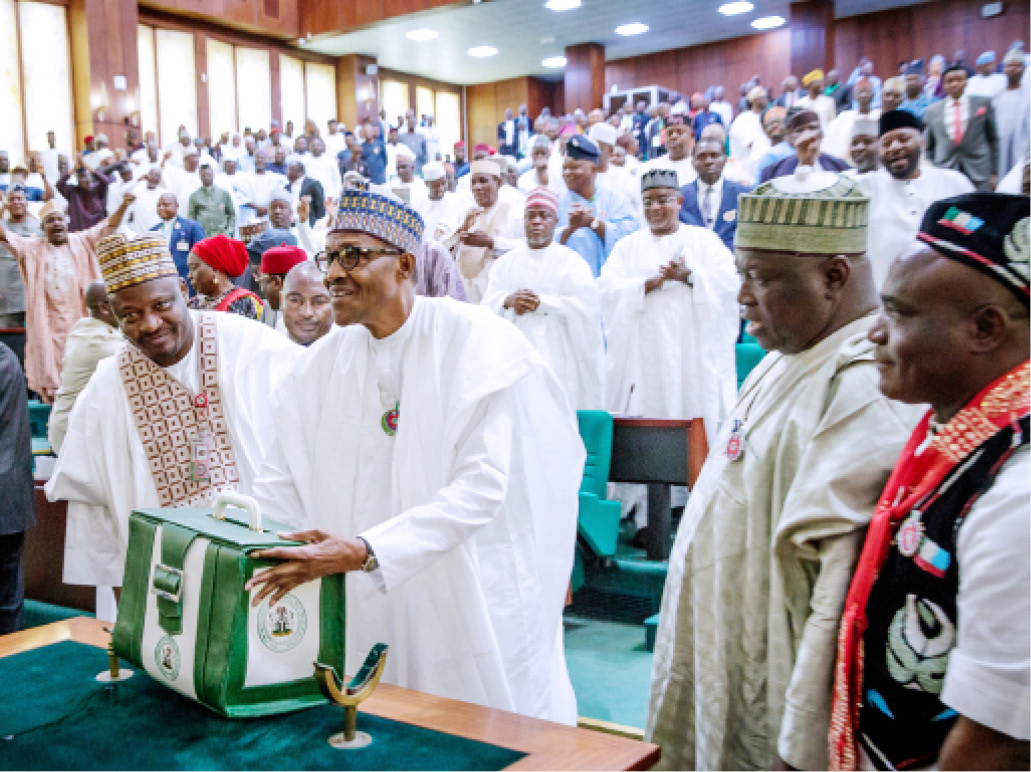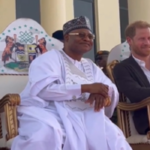President Muhammadu Buhari presented the 2019 Budget Proposals to the Joint Session of the National Assembly on Wednesday 20 December 2018. Its key aim is to, according to the President, ‘further place the economy on the path of inclusive, diversified and sustainable growth in order to continue to lift significant numbers of our citizens out of poverty’. The 2019 Appropriation Bill proposes an aggregate expenditure of N8.83 trillion for the year of which N4.04 trillion is recurrent, N2.31 trillion capital and N2.14 trillion will be devoted to debt service. The planned spending is lower than the 2018 budget by N300 billion. Allowing for 11% inflation rate, its real value is N7.95 trillion.
The proposed budget as presented is fundamentally flawed. Several inaccurate claims litter the budget document – all, I think, in an attempt for Mr. President to whitewash the regime and hide their monumental failure to improve, even minimally, the welfare and living standards of much of the population. I see the rhetoric of ‘inclusive, diversified and sustainable growth’ as no more than an amplification of the APC-led government’s renewed propaganda to hoodwink the citizens into believing that there is ‘light at the end of the tunnel’.
In reality, the economy is yet to recover from the 2016/2017 recession as it remains SEVERELY STRESSED, extremely fragile and vulnerable to external shocks. GDP growth declined from 2.11% in 2017 to 1.9% in Q1 and to 1.5% in Q2 of 2018. In Q3 of 2018 there was only a marginal increase of 0.3% to 1.8%.
In its current form, the local economy is not dynamic enough to journey to their so-called NEXTLEVEL. For the year 2019, a general slowdown in the real growth rates of economic activity in both the oil and non-oil sectors has been projected at 1.9% by the World Bank. This rate is well below the 2019 budget projection of 3.01% and is not enough to create the needed jobs for the growing population of the country or for the attainment of the SDGs.
As a sign of the weakness of the economy, the rate of unemployment has increased from 18.8% in 2017 to 23.1% in Q3 of 2018. Today, close to 20 million people are unemployed compared to 7.2 million people in 2014. These high rates of unemployment represent both a significant distortion in the economic system and a lost opportunity for critical national development and could potentially threaten social stability.
Sadly, Foreign Direct Investment (FDI) is limited and is declining. In Q3, 2018 capital inflows were US$2.855.21 billion showing a decrease of 48.21% compared to Q2 2018 and 31.12% decrease compared to Q3 2017. Indeed, its current level is the lowest since Q2, 2017. Value of Foreign Portfolio recorded at US$1.7 billion represents a decrease of 58.2% compared to Q2 2018. It also represents a 37.7% decrease compared to the Q3 of 2017.
Finally, it is very significant to note that capital importation in 2014 (Q3) was US$6.5 billion and in 2018 (Q3) US$2.9 billion. This shows US$3.6 billion or 55% decline since the regime came into power.
Even Mr. President’s acclaimed successes in agriculture can be interrogated. In spite of the so-called ‘increased investment across the entire value chain from agricultural inputs to farming and ultimately, food processing’, agricultural growth is well below historical levels. The growth in agricultural production declined from 3.48% in Q3 2015 to 1.91% in Q3 2018. Similarly, in 2018, growth has been declining from 3% in Q1, to 1.19% in Q2 and 1.91% in Q3. There is little evidence to show that ‘increased investment’ in agriculture has yielded positive results.
This brings us to what the key question is: can the 2019 budget place the economy on the path of inclusive, diversified and sustainable growth in order to continue to lift significant numbers of our citizens out of poverty as PMB claims? Here are 6 reasons why it cannot:
First, the 2019 is built on a very shaky foundation. It seeks to consolidate on the ‘achievements’ and ‘successes’ of the 2018 budget. However, the 2018 budget was itself poorly implemented. Actual revenue collected was only N2.84 trillion (as at September 2018) against projected revenue of N7.17 trillion. This implied that as at September 2018, only approximately 40% of projected revenues were realized by the Federal Government. Similarly, by December 14 2018, only N820.57 billion was released for capital spending out of a projected expenditure of N2.652 trillion. This implied that only 31% of the capital budget was implemented. This would impact negatively on growth, jobs and poverty.
Secondly, the 2019 budget is a business as usual budget. The Federal Government keeps repeating the same mistakes BUT expects different results. For example, although the current resource position remains precarious, government does not intend to introduce significant fiscal restructuring. Thus, in spite of dwindling revenues, subsidy on PMS will continue (US$1 billion is budgeted for that); Government does not intend to introduce any reforms in the foreign exchange market as multiple exchange rates will be maintained – thus given away between ₦300 billion and ₦800 billion to opportunists, rent-seekers, middlemen, arbitrageurs, and fraudsters; and finally, the budget is overwhelmingly recurrent, with capital spending taking the back seat.
Thirdly, 2019 Budget is based on grossly exaggerated assumptions. They are NOT able to put in place any coherent and comprehensive policies to give hope that these assumptions can be met. The most laughable assumption is that real GDP will grow at 3.01 percent. When indeed, GDP growth has been sluggish, with a projection of 1.9% in 2019. The government cannot cut spending and expect the economy to grow.
Fourthly and very fundamentally, 2019 Budget is very small. The size of the budget is not sufficient to stimulate growth of the economy, create jobs and alleviate poverty. The planned total expenditure of N8.83 trillion is lower than 2018 budget by approximately N290 billion. The Federal Government is contracting the economy whereas in a period of recession, governments MUST spend more to have meaningful impact on jobs and poverty.
The budget is also very low in relation to the size of the Nigerian economy, which is estimated at approximately N150 trillion. This means that the 2019 budget is barely 6% of GDP. (Compare Bangladesh 15.30%, India 12.74% and Afghanistan 11.9% in 2017). Again, this will have no meaningful impact on jobs and poverty.
Fifthly, Nigeria’s fiscal crisis persists and fiscal position of the Federal Government, and by extension, the states and local governments remains precarious. First, projected revenues of N6.97 trillion are 3% lower than 2018 and second, the oil sector continues its dominance as it contributes 54% of the budget revenues. The non-oil sector is expected to contribute only 20% of the budget revenues. There are no coherent and comprehensive plans to expand the resource horizon of the Federal Government.
As a result of the brewing fiscal crisis, budget deficit remains high at N1.86 trillion. This is equivalent to 21% of the budget and 1.3% of GDP. The implication is that the Federal Government will need to borrow more in 2018 to implement the budget. Debt Service is already putting a strain on government revenues. The sum of N2.14 trillion has been provided for debt service. This means that 30% of projected revenue will be used in debt service.
Six, as has been with previous budgets, recurrent costs and debt service will take a lion share of the budget as against capital expenditure. Capital expenditure will be only 23% of planned expenditure. On the other hand, 24% of the budget will be spent on debt service and 46% on overhead and personnel costs. Thus over 70% of the budget will be devoted to recurrent costs and debt service. This will not grow the economy and create jobs.
It is therefore putting it mild to say that the 2019 proposed budget is not developmental, will not pull Nigeria from the abyss and may, indeed accentuate the misery and hopelessness the Nigerian people have lived with since 2015.
Atiku Abubakar is former Vice President of Nigeria and Presidential candidate of the PDP.




